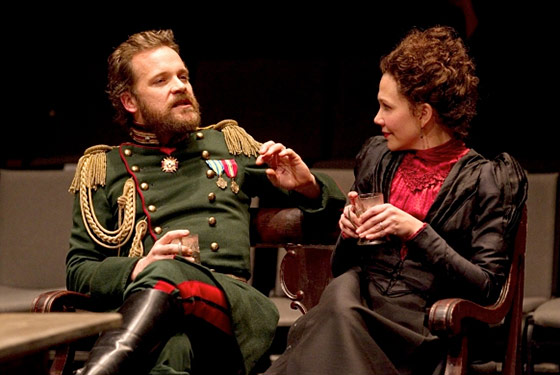
Nearly every actor is slightly miscast in the Classic Stage Company’s latest take on Three Sisters, that moody still-life about people slightly (and grossly) miscast in their own lives. Like one of those stolid birches Anton Chekhov loved so much, Austin Pendleton’s production has a way of growing over its own incongruities, sometimes in odd burls and buboes, until its core vitality is inseparable from its many little cancers. (Of course, there’s no disguising the slightly alien presence of Maggie Gyllenhaal and Peter Sarsgaard, married movie stars playing adulterous nobodies: As they did in a Pendleton-directed CSC Uncle Vanya two years ago, the pair seem perpetually amused at some private joke that originates not in the text or the dramaturgy, but in their Park Slope kitchen.)
But the show’s fidgety discomfort with itself works on the level of pure mood: Three Sisters is about people trapped inside the uninhabitable habitats of themselves, and Pendleton–an actor-director and an actor’s director, who clearly enjoys giving his players plenty of leash–has staged a deeply awkward Robert Altman cocktail hour on CSC’s intimate three-sided stage. (He gets a significant assist from Walt Spangler’s eerily minimalistic set, consisting mainly of a table, a piano, and some rope.) There’s an atmosphere of shaky entropy, dialogue dissolving into monologue: the only conversations that honestly and fully engage two parties are almost unbearably cruel. Sisters takes a while to find its whimpering–the entire first act, in fact–but the rewards are significant.
Chances are, you know these unfortunates–via the play or via life. The Prozorovs, Muscovites by birth and by nature, feel trapped in their one-horse mill-and-military town. Poor urbane Masha (Gyllenhaal) is unhappily married to the buffoonish pedant Kulgin (Paul Lazar) but carrying on with Col. Vershinin (Sarsgaard), commander of the garrison and, in social situations, a gabby amateur futurist. Her older sister, softhearted schoolmarm Olga (Jessica Hecht), wants to do some good in her narrowing world, but lacks the stamina to take the reins. And the youngest sibling, stubbornly virginal Irina (Juliet Rylance), simply wants to get back to Moscow, which has taken on a mythic significance in her increasingly constricted imagination–can she settle for mere provincial domesticity with the simple, homely, highminded Baron Tuzenbach (Ebon Moss-Bachrach)? And even if she could, will the obsessed sociopath, soldier and poet-manque Solyony (Anson Mount) allow her to?
At first, these questions take a backseat to the people raising them: What a motley bunch! It’s hard to believe the sisters, in particular, sprang from the same tree. They seem barely related, so cloistered are they within their own little temples of obsession. But do these obsessions belong to the characters or the performers? By the end, it’s hard to tell. Gyllenhaal, her famous cocker-spaniel peepers cynically half-lidded, radiates all of Masha’s bitterness–she has practiced and perfected her rueful chuckle–though she’s less adept with the character’s cold solipsism: Her take on Masha amounts to a catwalk turn, almost showy. As her beloved, Sarsgaard gamely and anti-heroically zeroes in on the Panglossian stupidity that lurks millimeters beneath Vershinin’s glittering charisma, but his self-satisfied mien quickly hardens into an actorly mask. Rylance has a clear line on Irina’s futile, progressively more infantile longings: Her “I want to go to Moscow, Moscow, Moscow!” will ring in your ears for days. But for all her technical skill, I’ve yet to see this actress open herself un-guardedly to an audience. Her Irina remains a locked diary.
Which is fine, actually. Everyone’s congenitally inaccessible in the Prozorov household–and into these insensate tenpins Natasha (Marin Ireland) comes crashing. A reedy blond comet of animal appetite and vulgar industry, with no inner life to hobble her, Natasha quickly takes over–and what a relief! Life, hideous, ravenous life–not some crepuscular imitation thereof–has kicked down the door! We in the audience could just kiss her–but then, she’d probably bite. Natasha marries the sisters’ dissipated brother Andrei (Josh Hamilton, too skinny and vital for this role, but showing off his slacker’s knack for internalizing a sense of doom). Gradually, she edges the sisters out of their own house. Ireland, with her ferocious lack of ceremony, is especially good at using the shiv-points of Paul Schmidt’s colloquial “American” translation. (Lines like “Andy, how come you never talk to me?” may surprise audiences more accustomed to the staid, British translations most of us learned in school.) Her tense scene with Hecht’s quietly excellent Olga (perhaps the one instance of truly perfect casting) gives us the play’s single moment of open confrontation. It’s a stunner, and evidence of the subtle work Pendleton and his gang of misfits have laid earlier in the evening.
The dough in this Three Sisters has yet to set, and enjoying it requires a certain amount of patience. But here’s hoping the thing never congeals too firmly: That might kill the subtler notes of strangeness and estrangement on offer here.
Three Sisters is at The Classic Stage Company (136 E. 13th Street) through March 6.

